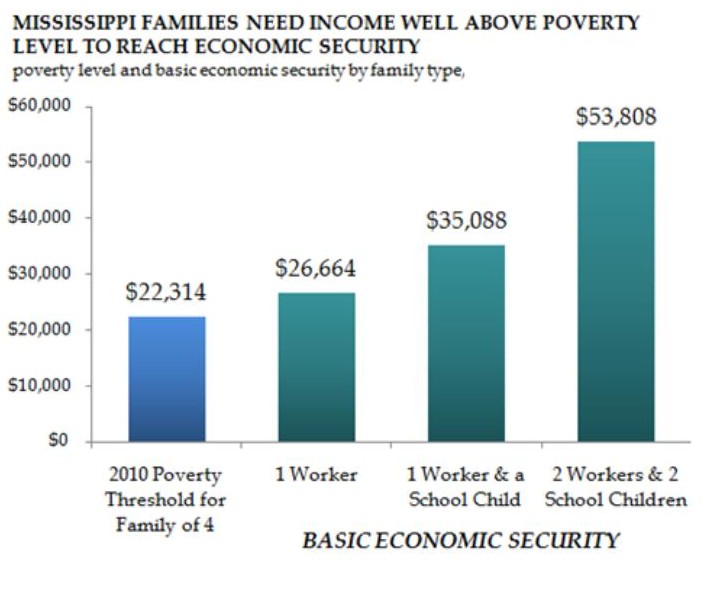Moving More Mississippi Families Toward Greater Economic Security
October 24th, 2011
Last week MEPC’s posts focused on the release of a new report, The Basic Economic Security Tables for Mississippi. In the post below we provide more background on the measure and recommendations for moving more families to greater economic security.
Poverty data from 2010 revealed that 22.4% of Mississippians lived in households facing extreme economic vulnerability. However, the Basic Economic Security Tables underscore that many families across our state are earning wages below what they need to provide basic needs for their families and save for retirement and emergencies such as a job loss or large health care bill.
The graphic above compares the Federal Poverty Threshold for a family of four to basic economic security levels for 1 worker, 1 worker and a school child, and 2 workers with 2 children. Families with 2 workers and 2 school children need $53,808 to provide basic needs for their families and save for their retirement and emergencies, more than double the Federal Poverty Level for a family of 4- $22,314.
Mississippi faces the challenge of enhancing opportunities for working adults to advance towards the income levels set by the Basic Economic Security Tables. Now knowing what families need to reach economic security, MEPC makes the following recommendations for lifting up more pathways to true economic security:
- Support sector initiatives that train low-skill, low-income individuals for in demand jobs
- Increase access to capital to start small businesses among historically underserved populations
- Support early childhood education and reducing costs through workforce support programs
All of these recommendations are not new to MEPC. We’ve long advocated for the enhanced investment in sector initiatives such as career pathways for low-skilled adults. We are also housed in a community development finance institution that has over 17 years of experience in lending to minority owned small businesses – especially in rural communities.
What is different today is that there is convergence around these recommendations with strategies that are currently being lifted up by the business community in Blueprint Mississippi. We must recognize the significance of this moment and work together to build the Mississippi that we all want to see for our children and grand children.
Authors: Sarah Welker, Policy AnalystEd Sivak, MEPC Director






